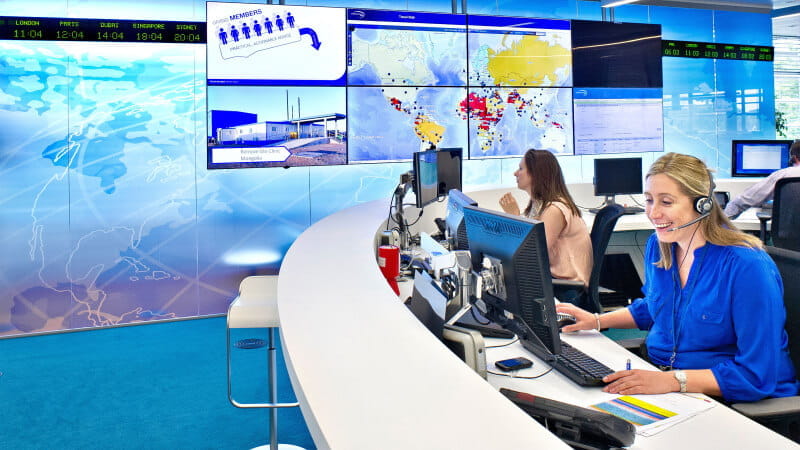PROTECT, DELIVER & SUCCEED
The world of humanitarian and development aid is changing. Field staff and volunteers are no longer protected by reputation alone. From terrorism and targeted violence to the rise of pandemics, aid workers face increased risks every time they are deployed on assignment. For decades we have been supporting NGOs to protect the health, safety and wellbeing of staff and volunteers who are at home and abroad, whether it’s for business, emergency response or delivering long term projects. We help to meet your Duty of Care responsibilities by protecting your people from the health and security risks in the complex environments they operate in.
OVER 40% OF OUR NGO CLIENT MEDICAL CASES OCCUR IN COUNTRIES RATED ‘HIGH’ OR ‘EXTREME’ RISK.
Global Medical and Security Assistance: Expert Support Anytime, Anywhere
At the core of our support structure, our global Assistance Centers deliver essential care and security interventions wherever and whenever they’re needed. Our extensive network, specialized expertise, and rapid response ensure support is always accessible, anytime, anywhere.
- 27 Global Assistance Centers owned and operated, staffed by medical, security, aviation, and logistics specialists.
- 24/7 support available for medical and security concerns.
- 90 languages supported by our Assistance Centers.

BENEFITS TO YOU AND YOUR ORGANIZATION

Educate your Travelers Before they Depart
Many NGO’s take extra precautions when deploying staff into high-risk countries or locations because the risks are obvious. The gaps start to appear when precautions are overlooked for travel that is perceived to be for business, of short duration or to low-risk countries. Even in seemingly benign countries and locations the security situation can change suddenly and without warning. Pre-departure preparation is important for everyone, regardless of their destination or trip duration. When considering Duty of Care obligations all staff are considered equal and should receive location briefings, health checks and screenings, and training on your organization’s emergency response plans.
Assess your Risk Exposure
Assess your risk of exposure in any location and recommend ways to mitigate the them. Provide your travelers, assignees and domestic staff with around-the clock access to local know-how.Stay Connected with your Staff
Stay connected with your employees and keep track of them. Our Workforce Resilience service supports your people every step of the way. We help them prepare for layered threat environments, monitor their location, warn them of emerging risks and provide professional health and security expertise.
How We Support Clients
As far as other NGOs are concerned, my advice would be – if you have staff in the field, this kind of support and assistance is essential. It is a no-brainer. How can people do their job properly in challenging overseas environments without this kind of assistance? What is more, it is totally universal coverage; whether we have a delegate flying to a conference in Geneva, or an aid worker assessing public health in the Philippines, International SOS is there for them 24/7.
Delivering Critical Medical Supplies to Ukraine and Bordering Countries
International SOS sourced and delivered over 200 medical equipment, consumables and pharmaceuticals to support donor-funded humanitarian organizations and local aid networks during the crisis in Ukraine.
Crisis ManagementSafetyUnrestPublic Health
SEE MORE

Psychological Impacts of International Business Travel
New whitepaper on the psychological impacts of business travel, 'Keeping Business Travelers Happy, Healthy & Engaged, at Home and Away'. The paper includes a ground breaking study of how business travel impacts traveling executives, carried out by an independent team of Occupational Psychologists at Kingston Business School (part of Kingston University, UK) and Affinity Health at Work, commissioned by International SOS Foundation.DOWNLOAD PAPER
Managing the Health and Safety of LGBT Mobile Workforce
For employers with international operations, there is no one-size-fits all answer when it comes to questions surrounding workplace law and LGBT employees.DOWNLOAD PAPER
Psychological Impacts of Remote Rotational Work
International SOS Foundation commissioned a ground-breaking global study into the psychological impacts of remote rotational work. Carried out by occupational health psychology consultancy and research group, Affinity Health at Work, the study brings together global findings from stakeholder interviews, a survey of remote rotational workers and an extensive literature review.LEARN MORE



